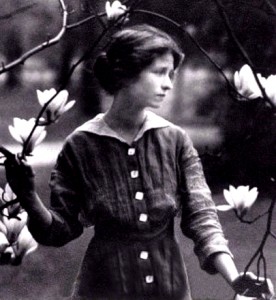Thin Rain…
Poetry is probably one of the few things that doesn’t typically get marginalized into genres. Sure, you have anthologies geared towards specific themes like Love/Romance or Nature but that seems fairly rare and certainly as artificial the literary classification that I’ve written about here from time to time.
Edgar Allen Poe notwithstanding, Poetry seems to be one of those things that people don’t typically associate with Horror — either as a genre or as an emotional reaction.
I don’t know that I’m smart enough or qualified enough to really delve into the nature of Poetry and how it works on us as readers — not without seriously embarrassing myself. But at the very least, I would like to share a poem that has stayed with me ever since I first read it, long ago when I was young.
There were a number of books on shelves in our family room — put there, I expect, because of the attractiveness of their binding and the need to fill the shelf with something. There was a multivolume set called “The Yale Library”, as I recall, along with a handful of other books that seemed to serve no other purpose than to be held up by decorative bookends on the mantle.
One of the books was a volume of collected poetry by Edna St. Vincent Millay. I think it must have been my father who first pointed me to her poem “Wraith” when I was still in elementary school:
“Thin Rain, whom are you haunting,
That you haunt my door?”
—Surely it is not I she’s wanting;
Someone living here before—
“Nobody’s in the house but me:
You may come in if you like and see.”
Thin as thread, with exquisite fingers,—
Have you seen her, any of you?—
Grey shawl, and leaning on the wind,
And the garden showing through?
Glimmering eyes,—and silent, mostly,
Sort of a whisper, sort of a purr,
Asking something, asking it over,
If you get a sound from her.—
Ever see her, any of you?—
Strangest thing I’ve ever known,—
Every night since I moved in,
And I came to be alone.
“Thin Rain, hush with your knocking!
You may not come in!
This is I that you hear rocking;
Nobody’s with me, nor has been!”
Curious, how she tried the window,—
Odd, the way she tries the door,—
Wonder just what sort of people
Could have had this house before…
It’s a ghost story, obviously. But it doesn’t read to me like a deliberate work of horror, although it’s difficult to know what Millay’s inspiration and intention was. I can remember combing through the rest of the book looking for something else, but (at the time) none of it struck me in the same way.
Because she didn’t write more in this vein, “Wraith” rings true to me, genuine. With apologies for my own speculation, the poem feels like it came directly from experience. Certainly most of the rest of her poetry follows that process, so why wouldn’t this one?
Not only does that make me feel a kinship with Millay but I also see that she felt that same quality, that sadness which seems to lie at the heart of a lot of ghost stories.
And that it is a poem only serves to enhance and expand that feeling of the other, the weird — I mean to say, that late-at-night-no-one-awake-but-me feeling that so often amplifies every sound and strips away the natural, rational skepticism that prevents us from remembering that we live among the dead, one world overlapping the other.
In my case, it doesn’t have to be that late at night, either.
Writing this, I realize for the first time how much this poem parallels my comments from a couple of days ago, the idea of home and comfort and how important those things are to us now and after we’re gone. Perhaps that’s one of the reasons why it has stayed with me for so long. When I finally left my parents’ home and went off on my own, Millay’s collection was one of the things that went with me.
I have it still and, still, it haunts me.
